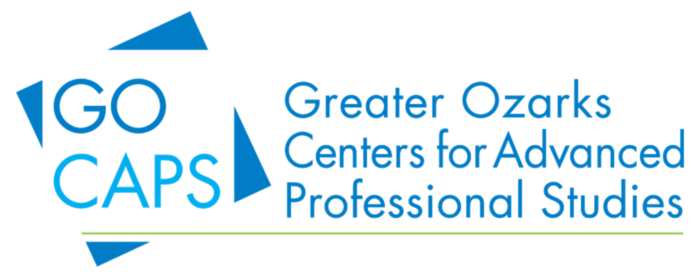This past December the CDR provided training on how to receive feedback effectively for over 100 high school students taking part in the Greater Ozarks Centers for Advanced Professional Studies (GO CAPS) program.
About the GO CAPS Program
In the unique year-long GO CAPS experience, high school juniors and seniors “test drive” future career options and develop real-world professional skills as they are embedded in partner businesses. Students join one of three strands: medicine and health care, business and entrepreneurship, or engineering and manufacturing. Then, together with their cohort, they engage in real-world, project-based learning through collaborations with businesses and community partners.
Why Feedback Training?
People who are good at receiving feedback are happier in their relationships, are more satisfied in their jobs, adapt more quickly to new roles and responsibilities, and get better reviews at work. However, receiving critical feedback can be painful, leading even the most seasoned professionals to become angry and defensive, or feel frustrated or unsure of how to improve.
Thus, it is no surprise that instructors in the GO CAPS program noted that many of their own students struggled to receive constructive feedback from both their teachers and their real-world supervisors. The organization approached the CDR to develop a customized training to enhance students’ abilities to make the most of the feedback they receive.
This training, first offered to students in 2019, focuses on helping students develop the vital job skill of processing the feedback they receive, with an emphasis on overcoming defensiveness and asking effective questions to make the most of feedback at work and beyond.
In each highly interactive 2.5-hour training, students explored the following:
- The characteristics of effective vs. ineffective feedback.
- Why feedback is a gift, and how to see it that way.
- Why we may accept or reject feedback.
- How our brains respond to feedback (often in counter-productive ways!).
- How to “mine for the gold” when given ineffective feedback.
- Ways to ask for feedback (and why you should).
- How to give others feedback for improvement .
Missouri State Student Involvement
Two students in the Certificate in Conflict and Dispute Resolution programs at Missouri State assisted in preparing for and offering these workshops.
Graduate student Kaitlyn Killingworth, who co-presented the trainings alongside CDR Associate Director Heather Blades, shared about her experience: “Receiving feedback well was not a topic I had ever encountered until I reached higher education, but now I can understand the power and growth to be gained from receiving feedback well. I was thrilled to be able to present and share this insight with high school students and help them learn more about themselves and the ways they respond to feedback, while also learning and thinking about the ways I receive feedback.”
What GO CAPS Students Had to Say
At the conclusion of each session, students shared reflections on what they had learned or what stood out to them. The following are examples of their insights:
- “Today I’ve learned the importance of not acknowledging only positive feedback. I’ve been reminded of how this is important as today taught me how to actually disagree professionally instead of just ignoring the feedback which I think is negative and therefore not relevant. “
- “One useful thing I learned today is that I should always use feedback to grow and become a better person. Denying criticism may make me feel better in the moment. But will harm me in the long term. Even if someone is angry, rude, and aggressive, my response can make their feedback valuable. “
- “I learned not to react with emotion, instead react with questions and being calm. Feedback can help you if you fully understand what they are telling you. Also, I learned that requesting feedback is OK. “
- “You can receive feedback correctly without accepting it. Say thank you, ask for examples, don’t rush to react, respectfully disagree using concrete examples. Request feedback not just from bosses but colleagues too. Be open to feedback given.”
The CDR looks forward to future opportunities to support students in our community through our collaborative partnerships with Springfield Public Schools. If your organization has an interest in learning more about feedback, or you would like to schedule training, please contact CDR Director Dr. Charlene Berquist at CharleneBerquist@MissouriState.edu.
For More Information on Customized Trainings and Workshops
For more information on the CDR’s virtual workshops or customized trainings, including a sampling of topics, please visit the CDR’s website, or call 417-836-8831 or email CharleneBerquist@missouristate.edu.

